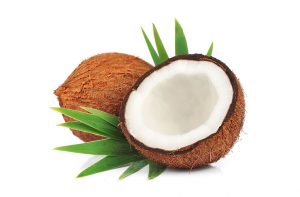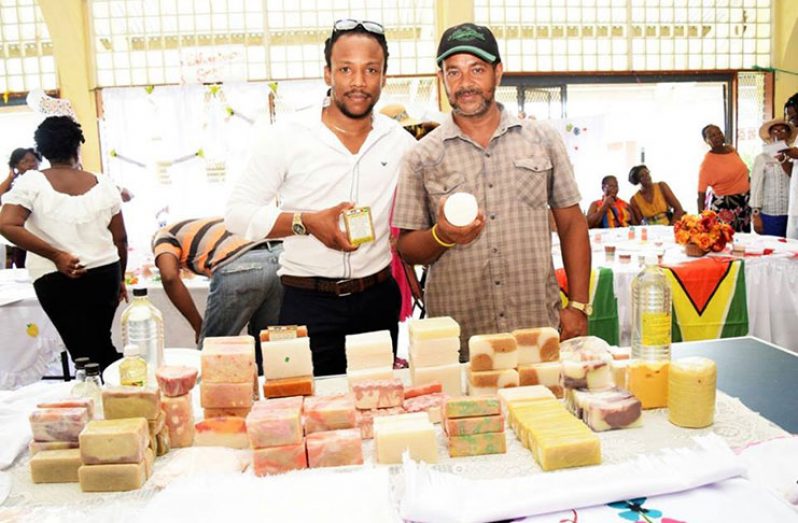–says Linden manufacturer
AS awareness of the overwhelming benefits of virgin coconut oil produced locally heightened, so did the interest of many who decided to make this long-lost secret their business.
This is very much in evidence in the mining town of Linden, where bottles of virgin coconut oil could now be seen at almost every block of the market arena.
One of the pioneers of virgin coconut oil production in Linden is Owen De Souza, a farmer. And with the upsurge in coconut oil production, he’s in for stiff competition.
He’s not taking any chances, despite winning over many customers with his sparkling clear and well packaged extra virgin oils. He’s decided to use this multi-purpose fruit for more than just making virgin coconut oil.
And that decision to diversify has sure paid off as today, he now owns his very own little factory in Block 22 Wismar, where he uses the coconut and other domestic fruits to manufacture soaps, sweet oils, and body creams.
Said he: “Coconut oil is not a dependable thing for me anymore, because there is so much other usage and products that you can make from the same virgin coconut oil.”
In addition to the coconut oil now being a by-product or main ingredient in other products, De Souza also uses fruits such as avocado, and herbs such as meringue to produce his soaps and creams. 
He sources his raw materials from his very own farm, something he encourages other local manufacturers to do.
And while he’s never had any formal training in oil and soap making, he’s been at it since a child.
“I never went to an institution or class, but I grew up in the oil business in Nabaclis; seeing my grandmother make soap and oil and casareep and cassava bread and all these things,” he said, adding:
“And I always knew about making extra virgin oil and fry-oil.”
With time, he got even better. “I get to learn which oil is the right flavour; will open your pores and detox the body, and I started checking the meaning of the chemicals in the dictionary, and I learned that the coconut oil has the best lather than any other oil, so I normally use that to test other oils such as olive oil, crab oil and black castor oil.”
BOTTLING A BIG ISSUE
One of the biggest challenges he has as a local manufacturer, however, is bottling, and as such is calling on the relevant authorities to establish a local plastic bottle factory, since the absence of one is running counter to the government’s call to push local manufacturing.
But apart from the increased competition in the virgin coconut oil business, De Souza said he also has difficulty sourcing the imported plastic bottles which are sold at a hefty cost and are not available in sizes that are price-friendly.
“We still have a problem with packaging with these bottles,” he said. “There is so much raw materials in our country that we can put into use and make products out of, but there is no bottling factory.
“I now miss our glass factory; we really need a bottle factory to produce bottles,” the manufacturer bemoaned, adding that it is not only an issue affecting him but most manufacturers who are producing other products such as achar, pepper and jam, who are forced to source recycled bottles.
Despite this hiccup, the Linden producer has plans of expanding his small factory and taking his business to the next level. He was high in praise for the Guyana Marketing Corporation (GMC) for their continuous support towards to growth of the business. De Souza is now in the process of having his business legalised and registered, and GMC is playing an integral role in having that phase expedited.
“I need to take it to the next level,” he said, adding:
“That is why we starting a new coconut plantation, where it is more accessible to the road, and easier to transportation that is on the Mabura Road. So, for the future, it doesn’t only have to be a De Souza thing, but a people thing.”
TEACHING OTHERS
While business is a competition, De Souza’s vision goes far beyond making money, but to see Linden push off through diversification.
He has, therefore, been taking time out of his busy schedule to teach residents of other communities the skill of soap and oil making, and is currently running a summer programme with youths in Block 22, who he even gives a daily commission for the work they put out.
He is encouraging the seasoned and potential manufacturers to move towards the use of their own raw materials rather than to purchase from other farmers, since it will be beneficial to the expansion of their businesses.
“I would advise anyone to start planting their own raw material, because, when your business expands, the farmers get jealous and the price then goes up.
“So, the best thing is to have your own raw material,” he advised.
This diversified farmer and manufacture is a fitting example that Linden can shoot off with local manufacturing, which can be the perfect substitute of bauxite mining that has long lost its glory days.




.jpg)









